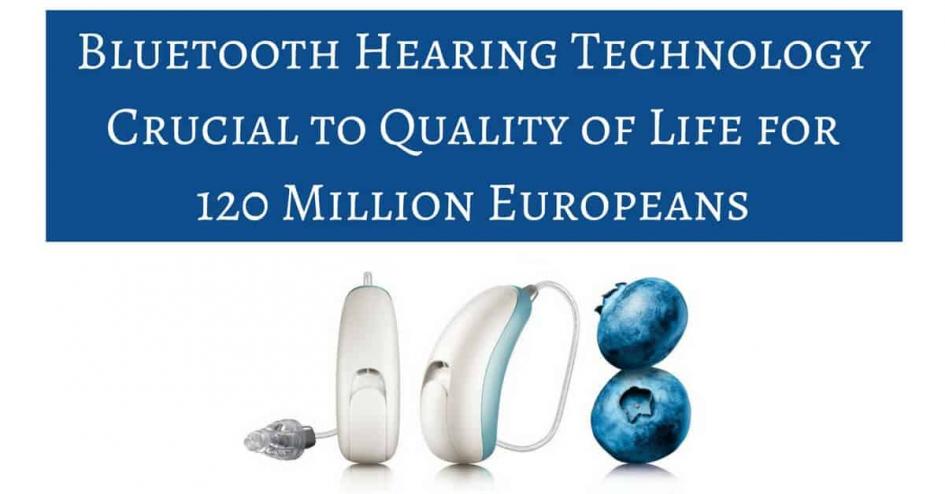
Bluetooth Hearing Technology Crucial to Quality of Life
Bluetooth Hearing Technology Crucial to Quality of Life for 120 Million Europeans
Today’s technology is moving at a breathtaking pace, and hearing aid users stand to reap the benefits. For 120 million Europeans living with hearing loss, Bluetooth technology has the potential to improve accessibility and quality of life. Many newer hearing aids already offer Bluetooth compatibility, allowing users to stream sound from Bluetooth-equipped devices such as smartphones and tablets directly to their ears. This rapidly-developing technology may hold the key to a more inclusive future for people with hearing loss.
What’s the fuss about Bluetooth?
Bluetooth is a wireless communication platform that uses bands of high-frequency radio waves to transmit data between electronic devices. You might have come across the technology on your smartphone, tablet or computer – or while using your hearing aids. Bluetooth-compatible hearing aids enable users to pair their hearing device with their smartphones, televisions or tablets, and stream sound directly to their ears. This means you can watch a movie on your laptop, listen to your favourite songs or take a call with ease. Bluetooth also allows users to discreetly control and personalise their hearing aid settings from their phone or tablet.
Bluetooth can greatly improve communication. Streaming sound directly to your hearing aids takes the stress out of chatting with a friend on the phone or taking a conference call. For children and students, the technology can also be a great help in the classroom or lecture hall. Bluetooth-based audio systems are starting to complement traditional hearing loops and FM systems in the classroom, often providing better sound quality and increased reliability.
Meanwhile, the range of Bluetooth-equipped devices is growing quickly. A variety of domestic items such as smoke alarms, baby monitors, doorbells and even cars are now compatible with the technology. Certain hearing aids, such as the Oticon OPN, can be programmed to connect with this “Internet of Things”, making life a lot easier for their users. ReSound offer the LiNX2, a “Made for iPhone” hearing aid that enables users to pair their aids directly with their Apple devices. Most other hearing aid companies carry Bluetooth-compatible hearing aids, streamers and accessories to help you connect to all the gizmos and gadgets around you.
What does the future hold?
The Belgian nonprofit organization Hear-it AISBL believes that Bluetooth holds the key to improving the lives of millions of Europeans with hearing loss. They predict its future use in public places, replacing traditional hearing loop systems in cinemas and theatres, shops and on transportation systems. This could represent a very positive step forward in terms of accessibility for people with hearing loss.
However, capitalizing on Bluetooth’s potential requires dedication on the part of governing authorities. Hear-it recently sent a letter to European and national regulatory authorities, organisations and politicians, to request a united approach to Bluetooth hearing technology across the continent.
Bluetooth uses public radio bandwidths to transmit data. Unfortunately, so do many other technologies, such as smartphones and tablets - and these can interfere with hearing aid signals. Because hearing aids are so small and have restricted access to power, they are limited in their ability to combat and filter out this kind of interference. This can have a knock-on effect on communication and hearing.
Hear-it are also concerned that public airways are being sold off to corporate companies or restricted to specific commercial technologies. They suggest that a small fraction of European Bluetooth technology bandwidths should be reserved and protected solely for hearing aid use. Doing so would protect the rights of millions of people living with hearing loss and provide them with a higher quality of life, matching the principles of the UN Convention on the Rights of People with Disabilities.
To read Hear-it AISBL’s full letter, click here.
For hearing aid users, Bluetooth technology opens up a world of possibilities. The technology is already proving to be a game-changer, and it is set to further improve accessibility and equality for people with hearing loss. If you are interested in upgrading to a Bluetooth-ready hearing aid, our hearing specialists are happy to help you find the solution that is right for you. Get in touch with us today by calling 0131 220 1220 or simply pop in to one of our centres.
House of Hearing UK
0131 220 1220
Edinburgh | Galashiels | Perth | St Andrews
Our Clinics
All House of Hearing clinics are in town centre locations and accessible to public transport and parking. Home visits also available if mobility is an issue.


.png)
.png)
.png)

.png)
